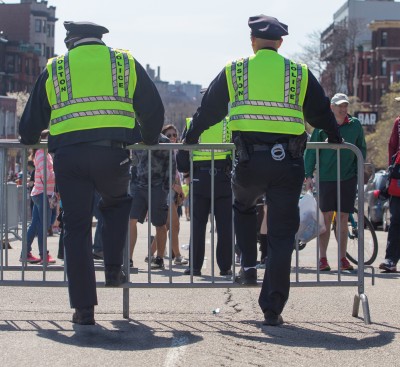
For the 120th Boston Marathon on Monday, Boston city officials and local agencies continued the practices of heightened security that have been in place since the April 2013 Boston Marathon bombing.
In a Wednesday press conference, Boston Police Department Commissioner William Evans expressed his hope for this level of security to become unnecessary in the future.
“After what happened in April of 2013, I don’t think we could have had a higher alert,” Evans said at the press conference. “We haven’t relented at all on that. Eventually, I like the idea that we’re going to have to wane ourselves off that, but I think after what’s happened at San Bernardino and what happened in Brussels, obviously this is not the year that we are going to scale it back.”
At the press conference, Boston Mayor Martin Walsh explained the need for security for the world’s oldest marathon, which serves as a “symbol of our collective strength and resilience.”
“We have a comprehensive safety plan in place for Marathon Monday itself,” Walsh said at the press conference. “For the past three years, we’ve greatly increased our public safety resources and taken significant measures in ensuring safety along the marathon route.”
At the press conference, Walsh said that on Monday, there were “over 5,000 police officers along the route, monitoring activity by both land and by air.”
In a Thursday press release addressed to students from local universities, Evans explained some of the additional security measures that were used on Monday.
“The Boston Police Department has developed a safety and security plan for the 2016 events to ensure both athletes and spectators who participate feel safe,” the release stated. “We have more cameras along the route in Boston and in addition to uniformed personnel there will be officers who are undercover working the crowd.”
University police departments in the Boston area also worked to enforce security measures to protect students and spectators. Boston University Police Department Captain Robert Molloy said they worked closely with BPD for security during the marathon.
“We’re going to have bike patrols, motorcycle patrols, foot patrols and radio car patrols focusing on the areas around the marathon route that intersect with Boston University, including areas with dormitories and a heavy amount of students,” Molloy said.
In another Thursday press release, BPD announced a ban on drones that was in place along the marathon route on Monday.
“Public safety officials are asking the public to assist in creating a No-Drone Zone along the entire course at this year’s Boston Marathon,” the release stated. “The use of drones … anywhere in the area of the course, including above runners and spectators, is strongly discouraged.”
Along the Boston Marathon route, there were also frequent security checkpoints, as announced by Walsh in both the press conference and the Thursday release. The release stated that large bags were subject to search at these checkpoints.
Boston Marathon Race Director Dave McGillivray added at the Wednesday press conference that the heavy security measures were necessary for the protection of everyone in attendance.
“Everyone, especially our runners, is accepting of the overall level of security that is necessary,” McGillivray said. “It comes to be what everyone wants and what everyone expects.”
Several Boston residents said they felt safer with the additional safety measures.
According to Eric Nichols, 37, of the South End, the safety measures were important not just for those participating in the race, but for everyone taking part in the marathon festivities.
“I mean, everyone needs to be protected,” he said. “The marathon needs to be safe for the runners, and the people watching and the police officers are just trying to make sure that holds true.”
Sarah Anderson, 36, of Back Bay, said the security measures helped spectators enjoy the Boston Marathon and remain at ease during the day of celebration.
“There’s always a risk at big events like this, and I think it’s important that the City of Boston wanted to make sure that everyone was safe and didn’t feel concerned or uneasy about enjoying the marathon,” she said.
Erika Reis, 39, of Back Bay, said she thinks security is necessary for any sort of event that draws such large crowds.
“Security is important anywhere where large groups of people are gathering,” she said. “There’s security at the airport, there’s security at concerts. It’s just a necessary step to protect people, and I’m glad they extended that to the marathon.”


















































































































